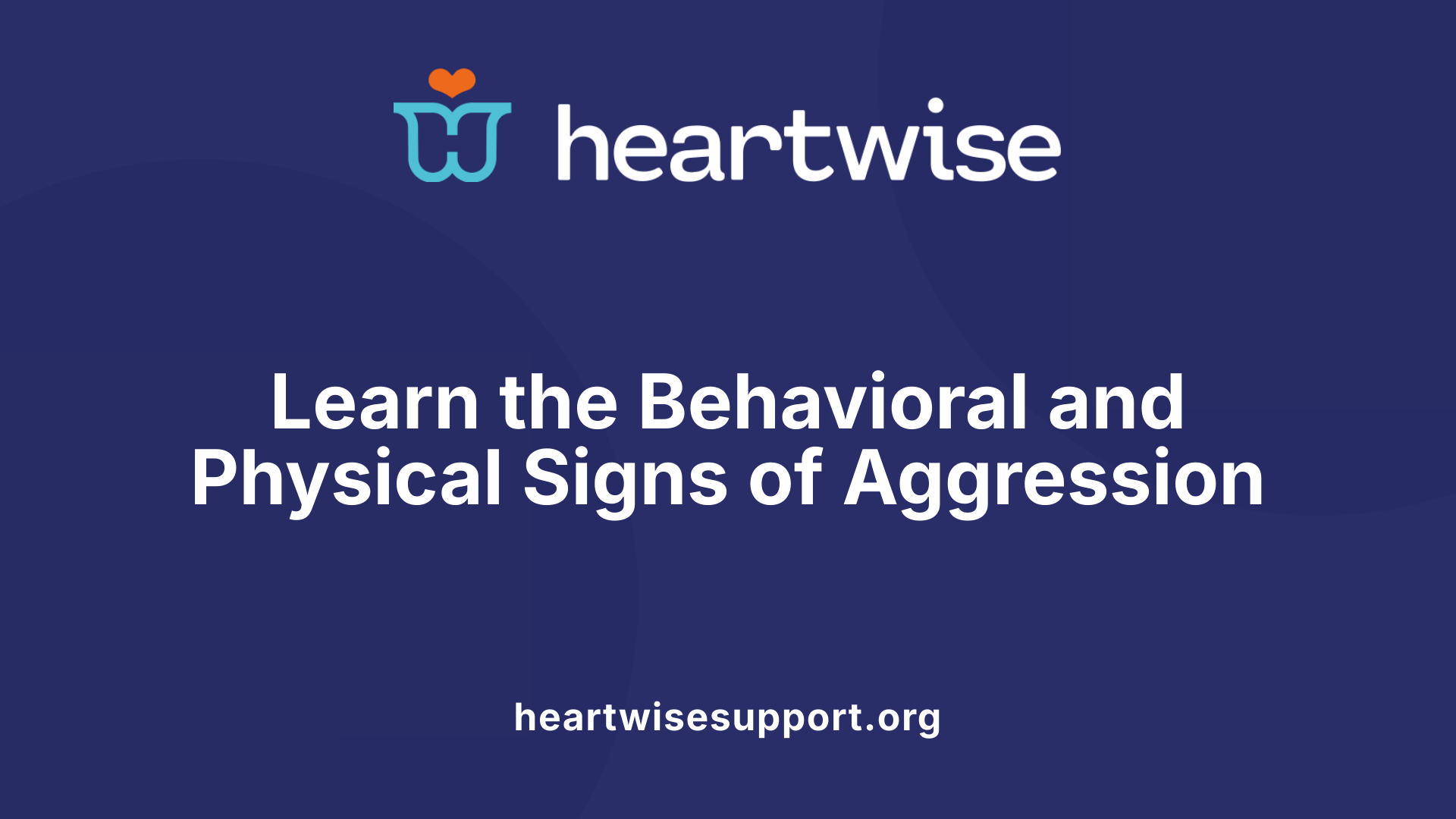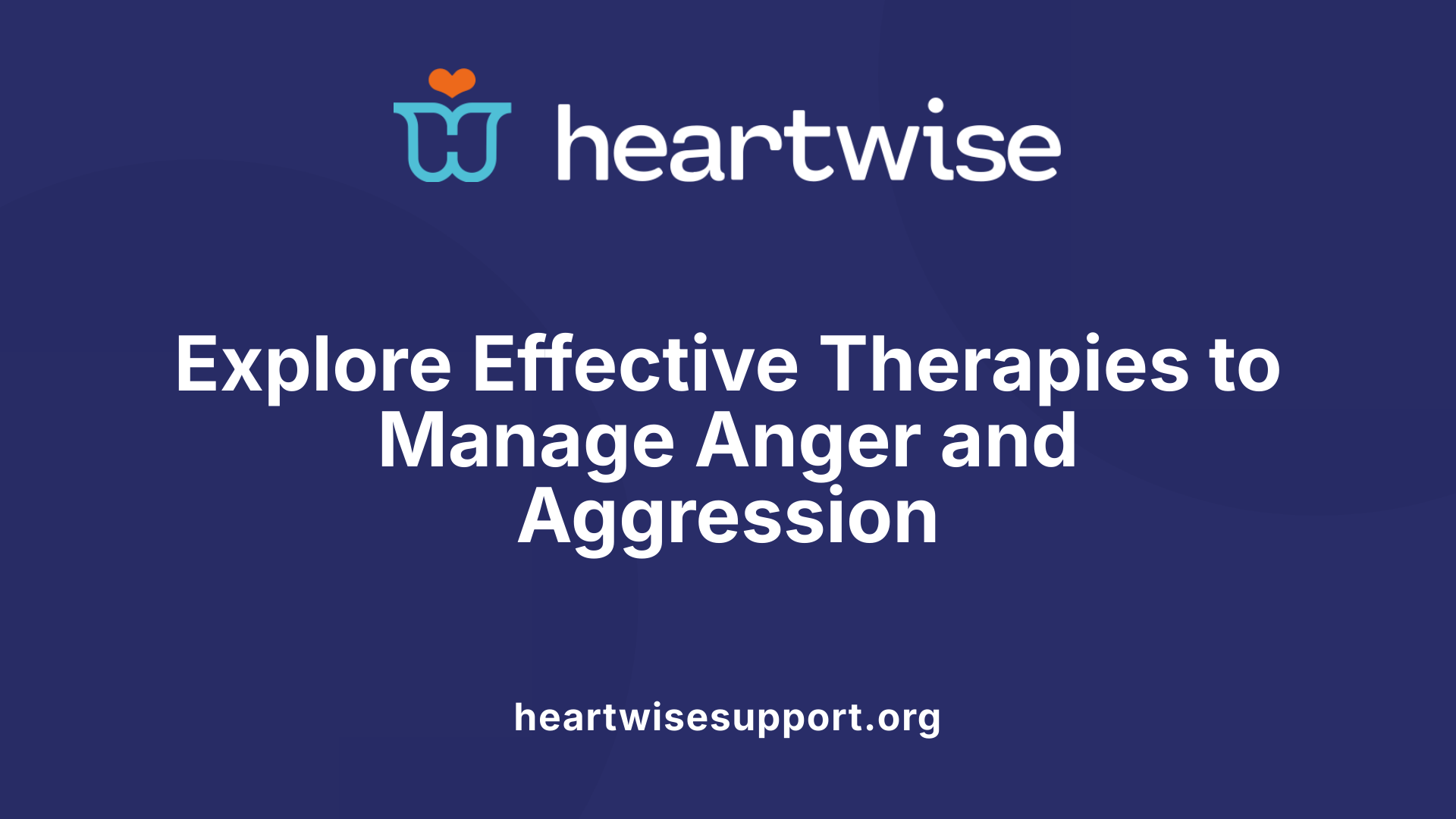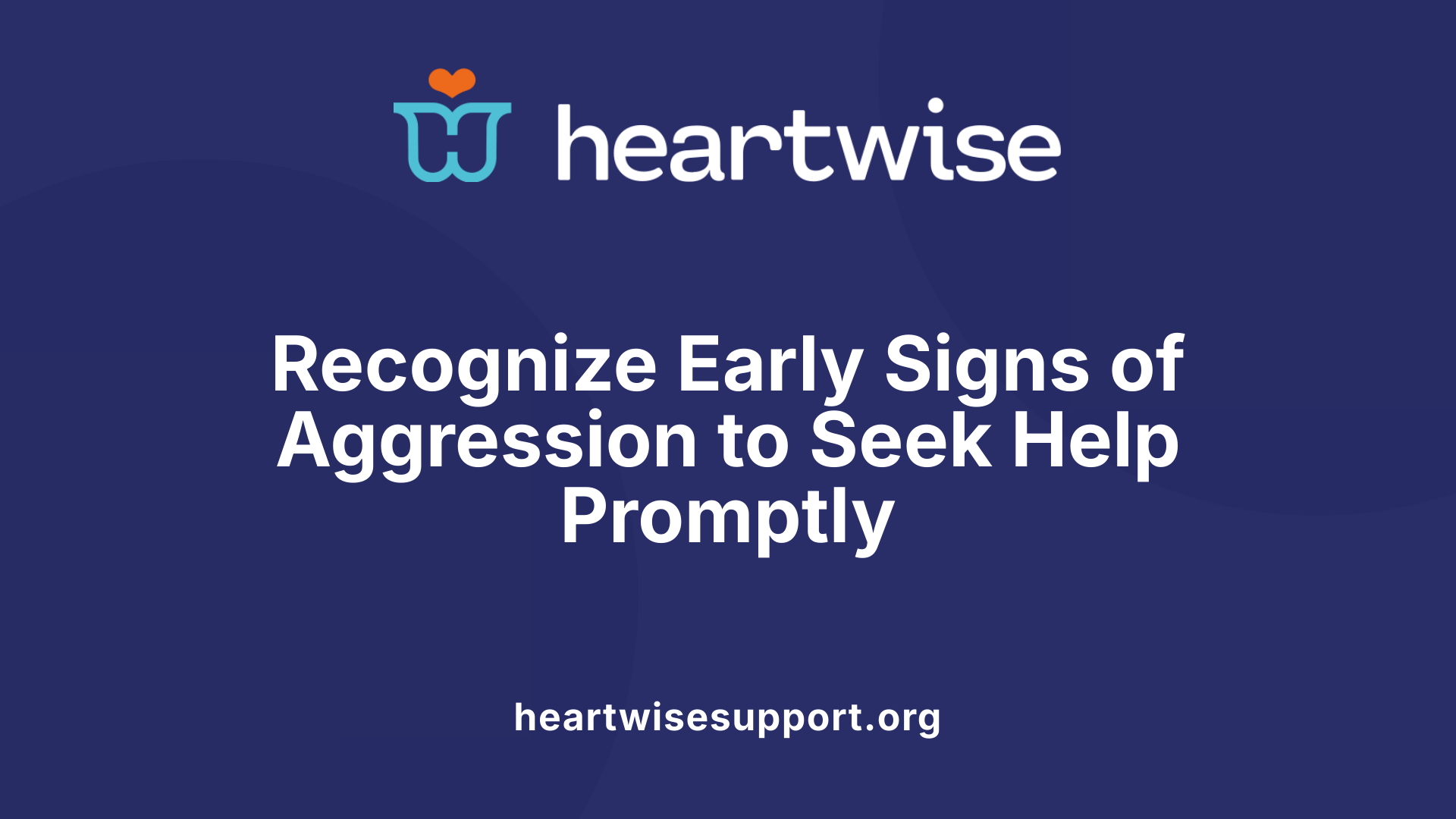Understanding the Role of Mental Health Therapy in Managing Aggression
Aggression, whether overt or subtle, can significantly impair personal relationships, professional life, and overall well-being. Recognizing the importance of mental health therapy in addressing aggressive behaviors is crucial for individuals, families, and mental health professionals. This article explores the various therapeutic approaches used to understand, manage, and reduce aggression, emphasizing evidence-based techniques and resources.
Identifying Signs and Symptoms of Aggression

What are the signs and symptoms of aggression related to mental health issues?
Aggression connected to mental health concerns can manifest through a variety of behaviors and physical cues. Recognizable signs include physical acts like hitting, kicking, biting, or destroying property. These behaviors often indicate underlying distress or frustration.
Verbal expressions—a common form of aggressive behavior—may consist of shouting, insulting others, or making threats. Such language often reflects emotional agitation and an inability to communicate constructively.
Relational aggression, which involves social manipulation, is also prevalent. Examples include gossiping, spreading rumors, teasing, and deliberately excluding others. These actions aim to harm social relationships or status.
Psychosocial symptoms accompanying aggression can be irritability, mood swings, or low frustration tolerance. Individuals might display increased agitation, feelings of anger, or become easily annoyed.
Physical signs also serve as visible indicators of aggression. These include clenched fists, flushed skin, rapid heartbeat, and tense muscles. Such physical cues suggest heightened physiological arousal associated with anger or frustration.
Cognitively and emotionally, individuals might experience poor decision-making, impulsivity, disorientation, or sudden mood shifts. These mental states can impair judgment and exacerbate aggressive responses.
Early recognition of these signs enables timely intervention. Understanding the range of manifestations—behavioral, physical, cognitive—helps caregivers and professionals address the sources of aggression effectively, preventing escalation and supporting mental health treatment.
Therapeutic Approaches to Managing Aggression and Anger
 Managing anger and aggression effectively often involves various psychotherapy techniques tailored to individual needs. Among the most studied and proven methods is Cognitive Behavioral Therapy (CBT). This approach helps individuals understand the thought patterns that lead to anger, identify triggers, and develop healthier responses. By reframing negative beliefs, clients learn to see conflicts more rationally, reducing impulsive reactions.
Managing anger and aggression effectively often involves various psychotherapy techniques tailored to individual needs. Among the most studied and proven methods is Cognitive Behavioral Therapy (CBT). This approach helps individuals understand the thought patterns that lead to anger, identify triggers, and develop healthier responses. By reframing negative beliefs, clients learn to see conflicts more rationally, reducing impulsive reactions.
Another highly effective therapy is Dialectical Behavior Therapy (DBT), which emphasizes emotional regulation and distress tolerance. DBT teaches mindfulness and coping skills that enable individuals to manage intense emotions and prevent reactive anger outbursts.
In addition to CBT and DBT, family therapy and psychodynamic therapy serve as valuable approaches to address underlying issues contributing to anger. Family therapy aims to improve communication and relationships within the family unit, while psychodynamic therapy explores deep-seated psychological roots of anger.
Relaxation techniques such as breathing exercises, meditation, and yoga are integrated into therapy sessions to lower physiological arousal associated with anger. These practices help calm the mind and body, making it easier to respond thoughtfully rather than react impulsively.
Cognitive restructuring is another vital component, guiding individuals to recognize dysfunctional beliefs—such as perceptions of unfair treatment—and replace them with rational, balanced thoughts. This process diminishes the emotional intensity of anger episodes.
Improving social skills is also emphasized through social skills training, which enhances communication, assertiveness, and conflict resolution abilities. Better conversation skills can prevent misunderstandings and reduce the likelihood of aggressive responses.
Some structured programs incorporate Cotterell’s 7-step intervention. This method involves analyzing the costs and benefits of anger responses, exploring moral disengagement, and developing personal strategies to manage triggers effectively.
Overall, these therapies provide individuals with the tools to manage their emotional responses proactively, communicate effectively, and address underlying issues that contribute to aggressive behavior. Consistent practice outside of therapy sessions consolidates these skills, leading to improved emotional control and healthier relationships.
How Therapy Assists in Reducing Aggressive Behaviors

How does mental health therapy help in reducing aggressive behaviors?
Therapy plays a crucial role in managing and reducing aggressive actions by focusing on the mental, emotional, and social roots of anger. Evidence-based approaches like cognitive-behavioral therapy (CBT) help individuals identify the thoughts and feelings that lead to aggression, and teach them healthier ways to respond.
One core element of therapy involves recognizing and avoiding the triggers that provoke anger. Therapists work with clients to become aware of situations, thoughts, or interactions that tend to escalate their feelings of hostility or frustration.
In addition, therapy aims to develop stronger emotion regulation skills. Techniques such as relaxation exercises, cognitive restructuring, and problem-solving enable individuals to better control their responses.
Family therapy and structured behavioral interventions like Parent Management Training (PMT) are also effective. These methods improve family dynamics by promoting positive communication, consistent discipline, and reducing environmental stressors that may trigger aggression.
Combining psychological therapy with medication can be particularly beneficial. When appropriate, medications like mood stabilizers or antipsychotics support treatment by controlling underlying mental health conditions, making behavioral therapies more effective.
Research shows that integrating these treatments leads to significant improvements in managing anger, reducing aggressive outbursts, and fostering better social interactions. Ultimately, therapy offers practical tools to help individuals manage their emotions and behave more adaptively in challenging situations.
Recognizing When Professional Help Is Necessary
 Anger and aggression are normal human emotions, but when these feelings become persistent and start to interfere with daily life, relationships, or work, it may be time to seek professional help.
Anger and aggression are normal human emotions, but when these feelings become persistent and start to interfere with daily life, relationships, or work, it may be time to seek professional help.
Signs such as frequent mood swings, social withdrawal, and difficulty managing daily responsibilities can indicate underlying mental health issues that require support. For example, if someone finds themselves constantly annoyed or irritable, or if their anger leads to conflicts or confrontations, consulting a mental health professional can be beneficial.
Additional warning signs include thoughts of self-harm or suicide, which demand immediate attention. If anger is accompanied by physical symptoms like unexplained aches, sleep disturbances, or changes in eating habits, these could be signs of depression, anxiety, or other mental health concerns.
Early intervention is crucial to prevent problems from escalating. Recognizing these signs early and seeking help can lead to better management of emotions, healthier relationships, and improved overall well-being.
In therapy, professionals can help individuals explore anger triggers, develop coping strategies, and address any underlying issues contributing to aggressive behaviors. Treatments like cognitive-behavioral therapy (CBT) have been proven effective in reducing anger outbursts and reactive behaviors.
If you observe persistent problems in managing anger that interfere with your daily life or if you have thoughts of harming yourself or others, immediate assistance should be sought. Contact a mental health provider, helpline, or emergency services without delay.
Remember, seeking help is a sign of strength, and early action can lead to lasting improvements and healthier ways of managing emotions.
For more information, searching for "When to seek help for anger and aggression" can provide additional resources and guidance.
Techniques Used in Therapy to Reduce Aggression
What techniques are used in therapy to reduce aggression?
There are several effective methods therapists employ to help individuals manage and reduce aggressive behaviors. These techniques are often based on cognitive-behavioral principles and are tailored to address the underlying thoughts, emotions, and situational triggers that lead to anger.
One foundational approach is cognitive-behavioral therapy (CBT), which targets dysfunctional thoughts and beliefs that fuel anger. Therapists work with clients to identify irrational or aggressive thought patterns and replace them with healthier, rational alternatives. This process often involves cognitive restructuring — a technique that challenges irrational beliefs and develops more adaptive ways of thinking.
Relaxation exercises also play a vital role. Practices like deep breathing, progressive muscle relaxation, visualization, yoga, and mindfulness help lower physiological arousal associated with anger. These techniques enable individuals to calm their body and mind, reducing the chance of reactive aggression.
Problem-solving skills are another crucial element. Therapy helps individuals learn to analyze stressful situations, develop practical solutions, and approach conflicts constructively rather than impulsively reacting with aggression.
Improving communication is addressed through social skills and assertiveness training. These sessions teach individuals how to express their feelings clearly and respectfully, setting boundaries without hostility.
Mindfulness and reappraisal techniques foster emotional regulation by encouraging individuals to observe their feelings without immediate judgment, fostering a pause that prevents aggressive outbursts.
Together, these strategies promote better emotional control, healthier relationships, and adaptive coping mechanisms, significantly reducing the likelihood of aggressive episodes.
Research on Therapy’s Effectiveness in Managing Aggression
What is the effectiveness of therapy in managing aggression?
Studies show that therapy, especially cognitive-behavioral therapy (CBT) and related techniques like Stress Inoculation Training, is highly effective in reducing aggressive behavior. Around 75% of individuals who undergo anger management therapy experience notable improvements. These results are supported by extensive research demonstrating that such therapies help people recognize what triggers their anger, change negative thought patterns, and develop healthier responses.
CBT interventions target emotional, physiological, cognitive, and social factors that contribute to aggression. Techniques such as relaxation exercises, cognitive restructuring, communication training, and problem-solving help individuals manage their anger more constructively. Additionally, stress inoculation training prepares individuals to handle stressful situations more effectively, reducing the likelihood of aggressive outbursts.
Emerging evidence indicates that mindfulness-based therapies, such as Mindfulness-Based Cognitive Therapy (MB-CBT) and Mindfulness Stress Reduction (MBSR), also contribute to anger management. These approaches help lower neural activity in brain regions like the amygdala, which is associated with anger responses, thereby addressing underlying neural and cognitive dysfunctions.
Family therapy and psychodynamic therapy offer alternative routes by addressing deeper emotional conflicts and family dynamics that influence aggressive behavior. These approaches work on resolving unresolved issues or psychological roots of anger, leading to improved emotional regulation.
Overall, therapy not only decreases violent or reactive behaviors but also enhances a person’s emotional resilience, relationship quality, and physical health by reducing chronic stress and anger.
| Therapy Type | Main Focus | Evidence of Effectiveness | Additional Benefits |
|---|---|---|---|
| Cognitive-Behavioral Therapy | Recognizing triggers, restructuring thoughts, relaxation | 75% improvement rate in aggressive behaviors | Better communication, emotional control, health outcomes |
| Stress Inoculation Training | Rehearsing coping skills for stressful situations | Effective in reducing reactive anger | Builds resilience against future triggers |
| Mindfulness-Based Approaches | Lowering neural reactivity, cultivating awareness | Reduced amygdala activation, improved emotional regulation | Reduced neural and cognitive dysfunctions |
| Family and Psychodynamic Therapy | Resolving emotional conflicts, family issues | Addresses underlying psychological causes | Deep emotional change, improved interpersonal skills |
While current research presents promising results, more rigorous, long-term studies are needed to establish the durability of these therapy effects. Nonetheless, the evidence consistently supports therapy as a vital tool in managing and reducing aggression.
Harnessing Therapy for a Healthier Emotional Future
Effective mental health therapy plays a vital role in managing aggression, offering individuals tailored techniques and evidence-based strategies to control impulses, understand their triggers, and express emotions constructively. From cognitive-behavioral interventions to mindfulness practices and family therapy, these approaches aim not only to reduce harmful outbursts but also to foster healthier relationships, improved self-control, and overall well-being. Recognizing the signs of aggression and knowing when to seek professional assistance can be life-changing, emphasizing the importance of accessible resources and early intervention. As ongoing research validates the effectiveness of these methods, integrating therapy into comprehensive mental health care remains essential to building a safer, more emotionally resilient society.
References
- 11 Anger Management Therapy Techniques and Interventions
- Understanding anger: How psychologists help with anger problems
- Anger Management Therapy: Techniques and Efficacy - Verywell Mind
- Anger Management Therapy & Treatment, Benefits and Risks.
- Behavioral Interventions for Anger, Irritability, and Aggression in ...
- Mental health problems | Find support for anger - Mind
- Managing a client who is angry or aggressive - Cracks in the Ice
- Managing Violent and Aggressive Behavior: Strategies for Mental ...
- Anger management: 10 tips to tame your temper - Mayo Clinic
- Aggressive Behavior: Signs, Causes, and Treatment - Healthline











